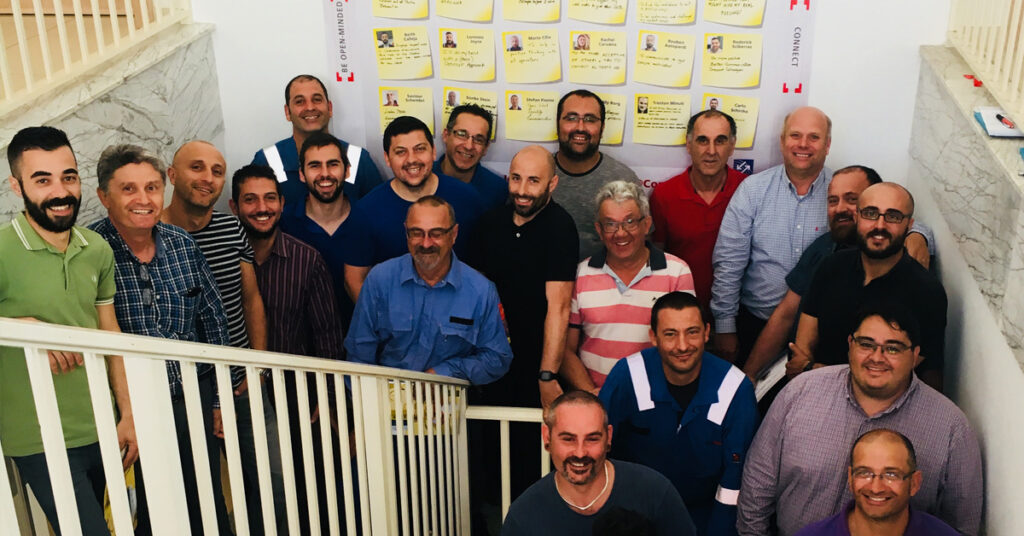I need to lead and guide, not to boss my people
Throughout his career, Sönke Stein has worked in very different cultures from Europe, to the Middle East and India. And although there are a lot of differences between them, Sönke has learned that being a leader requires a set of skills that works everywhere: listening, talking, and leading by example.

Being the boss used to mean in the old days that you took charge, told everybody what to do and your people ‘just had to follow’. In my years as a manager and being a CEO, I’ve learned that this style, whilst needed in start- up or phases of extreme change, is untenable in the long run. Especially if you work with a smaller team that has been together for a very long time, like the one I am leading today here at Oiltanking Malta. This team has been together so long, it is almost like a real family.
Even in the best families…
My predecessor used to lead the company during its start- up phase and early years of operation by that old style. He was a former merchant captain, so I guess for him this was normal. He certainly developed a very structured and solid foundation for the Company, which I was lucky to inherit for my first posting as a Leader of an organization. He raised a strong and solid family, with a good set of values. But as I said: what happens in families if they grow and get more mature over time? Some don’t get along, but will not talk about it. They will put all their feelings and frustrations in a box.
At some point, that box overflows and everything comes out all at once and normally at the wrong time. I wanted to prevent that when I started. Because our team is relatively small – we have a total of 80 people working here in the Port of Marsaxlokk in Malta, a quarter of which have managerial duties – it is paramount that we communicate well between our team members. And since most of them have been here a long time and know everything there is to know in their own field, who am I to tell them what to do? If there is one thing I have learned in my career, is that the people on the floor know what to do best. So instead of me telling them what to do, I ask them what and how they would do things.
A little help to slow down
Of course, this isn’t as simple as it sounds. Especially if a company culture has been around for decades. So, to help us achieve this, we enlisted the help of Authentiek Leiderschap. Initially the Management Team and Department Heads joined the program Connect@Malta. The goal was to get us all to really talk and listen to each other, to connect. That requires time. And time is often sparse in today’s international business culture. As one of Authentiek Leiderschap’s mantras says: “slowing down is speeding up”, we literarily slowed down by taking a long walk with each other. This really helped us to listen to each other.
For us, the program was such a success, that we started a second one with the second layer, of which our shift leaders are also part of. In that way, they could benefit from it as much as the Management Team did. At the same time it helps me to prepare the next generation leaders for the future. In the coming years, some of the family will retire and I want to make sure that the others are ready to follow them up. We don’t like them to be clones of their predecessors, we want them to develop their own leadership style. By this program we can give them the tools. We are even in the planning stage of also letting the guys on the floor take part in a third program week. That is how important the help of Authentiek Leiderschap for us is; we feel everybody here should benefit from it.
Providing the lanes
As a CEO, I need to lead and guide, not to boss my people. I often compare my job to a swimming competition in a large pool. Our employees are the swimmers; they know how to get to the target the best, fastest and most efficient way. All I have to do is provide them with the lanes, so that they won’t drift off or run into one another. That does mean that sometimes I must steer my team into a particular direction. For me the best way to do that, is to talk with them. Tell them the plans and listen to them, to see if there are better ways. Just like the lanes in the swimming pool: The lines give guidance, but they have flexibility.
Sönke Stein is CEO of Oiltanking Malta. Oiltanking is one of the largest independent operators of tank terminals for oils, chemicals and gases worldwide. The company owns and operates 73 terminals in 24 countries with a total storage capacity of 20 million cubic meters. Oiltanking Malta has operated for almost over three decades from the port of Marsaxlokk in Malta and has seen a substantial growth over these years.
